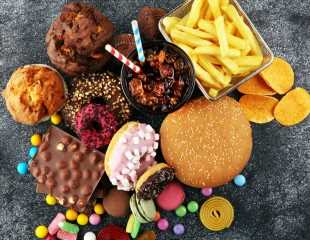Many of the comic's online quizzes revolve around food high in fat, salt and sugar. Experts call it "incredibly irresponsible" and want the company to change its policy.
The website of the UK children's comic the Beano describes itself as "100% safe for children" – but is its junk food-related content doing more harm than good?
An investigation by The BMJ shows how the Beano's website—promoted as a digital hub for 6- to 12-year-olds—showcases products from well-known brands that are harmful to children, including fast food, confectionery, soft drinks and ultra-processed food.
Since its launch in 2016, 47.9 million children have visited beano.com, which includes frequent references to well known high fat, salt and sugar (HFSS) brands, explain Claire Mulrenan and Mark Petticrew at the London School of Hygiene and Tropical Medicine and freelance journalist Harry Wallop.
For example, there is a 'Ultimate McDonald's Quiz,' 'How Well do you know the Nando's Menu' quiz, and a 'Skittles jokes' page. There is also an 'Ultimate Food Logo' quiz, whose ten answers are: Greggs, Heinz, Pizza Hut, Nando's, Subway, Domino's, Quorn, KFC, Pizza Express and Burger King.
There is even a quiz that features alcohol, with the question 'how long have humans been making beer for?' accompanied by an image of a pint being poured.
There is no suggestion that any of these quizzes have been paid for by the brands themselves, which could be deemed as a form of advertising known as "advergames" under the self-regulating UK Code of Non-broadcast Advertising and Direct & Promotional Marketing (CAP).
Health campaigners, however, are disappointed with Beano's willingness to showcase so many junk food brands – and to put these brands right at the front of children's minds, suggesting that a chocolate, fizzy drink or burger brand is "cool" – even if it's not taking money from the companies themselves.
With estimates that 22% of reception aged schoolchildren are overweight or obese, rising to 37% of children by year 6, health experts are also deeply concerned.
Kat Jenner, director of nutrition, research, campaigns, and policy at the Obesity Health Alliance, says, "It is an incredibly irresponsible way of promoting unhealthy food," while Boyd Swinburn, professor of population nutrition and global health at the University of Auckland and honorary professor at the Global Obesity Centre in Melbourne, believes that the company is being "naive" in giving "free advertising" to HFSS brands and products.
Through these quizzes and games, beano.com also collects data on children's consumption preferences, which is then sold, on an anonymised basis, to companies looking to find out more about what children like and don't like.
Beano insists that its surveys meet all legal and data protection obligations, and say "any suggestion that Beano is somehow contributing to increased consumption of HFSS products in children is false, misleading and damaging."
Nevertheless, campaigners say that there's a question around whether the company has an ethical duty to safeguard child health, write the authors.
Henry Dimbleby, lead author of the National Food Strategy, which called for a salt and sugar tax on processed food, says: "People at Beano might be thinking: 'Oh, well, you know, it's just a little bit of fun, that's what the kids like.' But I just think it is all pervasive in society. This stuff invades every element of their lives."
Former health minister James Bethell agrees. Pointing to UK government plans to delay a ban on junk food adverts before 9pm on TV and online, he says: "What annoys me about this is just the relentlessness of it in young people's lives. There's no escape."
Because Beano says that it hasn't taken money from any of the HFSS brands that so often feature in its quizzes, the stricter (and now delayed) rules about marketing junk food to children would not stop the company from continuing to showcase so many burgers, pizzas, crisps, and fizzy drinks or from suggesting that these brands were "cool" write the authors.
Nor would it stop the comic running Forknite, a game fronted by one of its characters Minnie the Minx who has "been served up a plate of vile veg and she needs your help to eat them and defeat them!".
J. Bernadette Moore, associate professor of obesity at the University of Leeds, says, "This idea that children won't like healthy food pervades all aspects of our society. Yet companies with such extensive young audiences must acknowledge that they are not merely reflecting child preferences but shaping them."
Beano responded, "We take enormous care in what we present to children particularly around health and wellbeing," adding that its website also runs some positive content about fruit, vegetables, and healthy eating, including the "Ultimate Vegetarian Quiz."
But Swinburn argues that Beano must do better, and he called on the company to change its policy and to no longer showcase products that are harmful to children – including alcohol, fast food, confectionery, soft drinks, and ultra-processed food.
He concludes, "Corporations which are clever enough to capture and hold children's attention need to have very high ethical standards to ensure that they are not exploiting those same children by promoting unhealthy products to them."
BMJ
Mulrenan, C., et al. (2023) Big Macs and the Beano: Is it time for the comic to drop the junk food brands?. The BMJ. doi.org/10.1136/bmj.p197.
Posted in: Child Health News | Healthcare News
Tags: Alcohol, Beer, Child Health, Children, Chocolate, Food, Fruit, Global Health, Hygiene, Junk Food, Medicine, Nutrition, Obesity, Research, Running, Soft Drinks, Vegetables, Vegetarian
Source: Read Full Article
